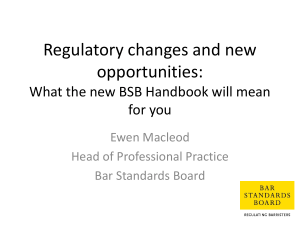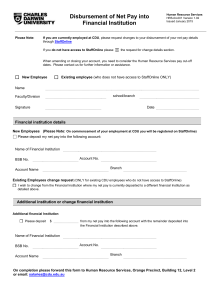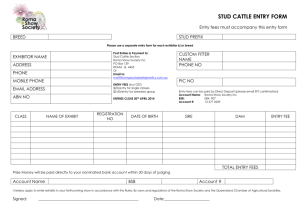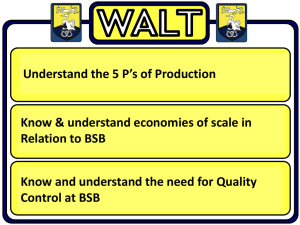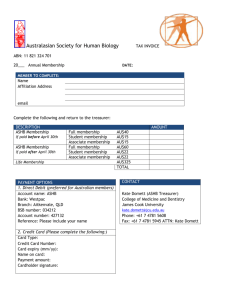BSB Constitution - Bar Standards Board
advertisement
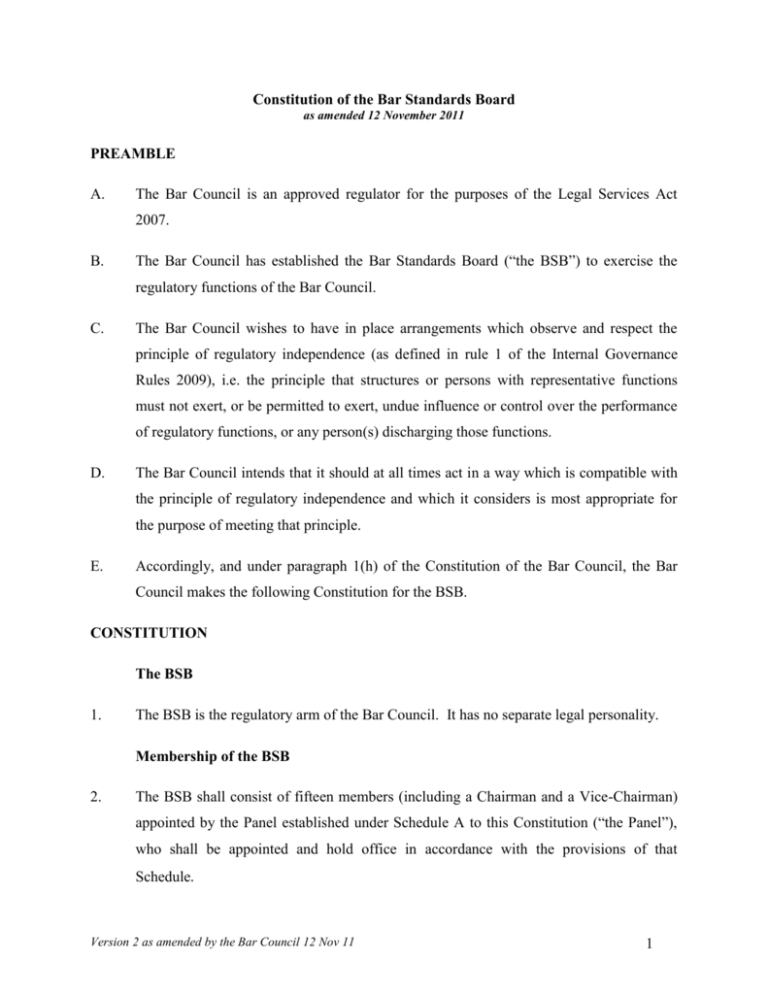
Constitution of the Bar Standards Board as amended 12 November 2011 PREAMBLE A. The Bar Council is an approved regulator for the purposes of the Legal Services Act 2007. B. The Bar Council has established the Bar Standards Board (“the BSB”) to exercise the regulatory functions of the Bar Council. C. The Bar Council wishes to have in place arrangements which observe and respect the principle of regulatory independence (as defined in rule 1 of the Internal Governance Rules 2009), i.e. the principle that structures or persons with representative functions must not exert, or be permitted to exert, undue influence or control over the performance of regulatory functions, or any person(s) discharging those functions. D. The Bar Council intends that it should at all times act in a way which is compatible with the principle of regulatory independence and which it considers is most appropriate for the purpose of meeting that principle. E. Accordingly, and under paragraph 1(h) of the Constitution of the Bar Council, the Bar Council makes the following Constitution for the BSB. CONSTITUTION The BSB 1. The BSB is the regulatory arm of the Bar Council. It has no separate legal personality. Membership of the BSB 2. The BSB shall consist of fifteen members (including a Chairman and a Vice-Chairman) appointed by the Panel established under Schedule A to this Constitution (“the Panel”), who shall be appointed and hold office in accordance with the provisions of that Schedule. Version 2 as amended by the Bar Council 12 Nov 11 1 3. The members of the BSB shall consist of: (1) Seven practising barristers who are not members of the Bar Council (provided that the Panel may instead of one practising barrister either: (a) appoint a person who is neither a practising barrister nor a lay person if that person is the best candidate for appointment; or (b) re-appoint a member of the BSB who is neither a practising barrister nor a lay person). (2) Eight lay persons. Functions of the BSB 4. The BSB is responsible for performing all regulatory functions (as defined in section 27(1) of the Legal Services Act 2007) of the Bar Council. 5. The BSB is responsible for determining any question whether a matter involves the exercise of a regulatory function. 6. The BSB has no representative functions (as defined in section 27(2) of the Legal Services Act 2007). Duties of the BSB 7. The BSB must act in a way which is compatible with the obligations imposed on the Bar Council or its delegate by the Legal Services Act 2007 or by any other law relating to the exercise by the Bar Council or its delegate of its regulatory functions. 8. The BSB must, so far as is reasonably practicable, act in a way: (1) which is compatible with the regulatory objectives defined in section 1 of the Legal Services Act 2007; and (2) which the BSB considers most appropriate for the purpose of meeting those objectives. Version 2 as amended by the Bar Council 21 Nov 11 2 9. The BSB must at all times act in a way which is compatible with the principle of regulatory independence and which it considers is most appropriate for the purpose of meeting that principle. 10. The BSB must have regard to: (1) the principles under which regulatory activities should be transparent, accountable, proportionate, consistent and targeted only at cases in which action is needed; (2) any other principle appearing to it to represent best regulatory practice; (3) any guidance issued by the Legal Services Board under rule 11 of the Internal Governance Rules 2009; and (4) the responsibilities and legitimate interests of the Bar Council as an approved regulator for the purposes of the Legal Services Act 2007, including the Bar Council’s responsibility for oversight and monitoring of the BSB (in a manner consistent with the provisions of and made under the Legal Services Act 2007). 11. The BSB must: (1) Supervise and monitor the work and conduct of any committee, sub-committee, panel, working party, body or person referred to in paragraph [14(3)] below. (2) Monitor and ensure the just operation of disciplinary tribunals and any other panels assigned to determine (whether at first instance or on appeal) any issues as to the conduct of individual barristers, including whether barristers are guilty of professional misconduct or inadequate professional service or ought to be suspended from practice by reason of medical unfitness or criminal charges or convictions. (3) Ensure that equal opportunity and diversity issues are taken into account in respect of regulatory functions. Version 2 as amended by the Bar Council 21 Nov 11 3 (4) Liaise as it considers necessary or appropriate with the Bar Council, the Inns’ Council, the judges, other committees of the Bar Council and such other bodies or persons as it may consider necessary or appropriate. (5) Prepare and keep under review a plan for the development and effective discharge of the regulatory functions of the Bar Council. (6) In connection with all matters concerning the financial and other resources provided to the BSB by the Bar Council: (a) co-operate with the Bar Council; and (b) comply with the relevant procedures and requirements of the Standing Orders of the Bar Council. (7) In connection with the oversight and monitoring of the BSB by the Bar Council: (a) co-operate with the Bar Council; (b) provide to the Bar Council all information and documents which it may reasonably request; and (c) comply with any reasonable request by the Chairman of the Bar Council that he or any person nominated by him should be permitted to attend any meeting of any committee, sub-committee, panel, working party or other body established under paragraph 14(3) below. (8) 12. Prepare an annual report to the Bar Council on its work for publication. The BSB must act in accordance with the “Nolan” principles of public life (set out in Schedule B to this Constitution) at all times and, in particular, when appointing, or making arrangements for the appointment of, the members of any committee, subcommittee, panel, working party or other body established under paragraph 14(3) below. Version 2 as amended by the Bar Council 21 Nov 11 4 Powers of the BSB 13. The BSB shall have power to do all things calculated to facilitate, or incidental or conducive to, to the performance of its functions or duties. This includes, but is not limited to, power to do the things set out in paragraphs 14 and 15 below. 14. The BSB shall have power: (1) To regulate its own procedure. (2) To make such rules and/or arrangements as it considers necessary or appropriate. (3) To establish, and regulate the procedure of, such committees, sub-committees, panels (including advisory panels, whether representing consumer interests or otherwise), working parties, other bodies as it considers necessary or appropriate to enable it to discharge any of its functions or duties. (4) If, and on such terms as, it considers necessary or appropriate to enable it to discharge any of its functions, to delegate any of its functions to (or make or approve any arrangements for the delegation of those functions by): (a) any committee, sub-committee, panel, working part or other body established under paragraph 14(3) above; or (b) (5) any other person or body. To invite any person to attend any meeting of the BSB in an advisory or consultative capacity. 15. The BSB (and any of its members or any other person involved in the exercise of the Bar Council’s regulatory functions): (1) may make representations to, be consulted by and enter into communications with any person(s) appearing to it to be relevant to its functions; and Version 2 as amended by the Bar Council 21 Nov 11 5 (2) may notify the Legal Services Board where it considers that its independence or effectiveness is being prejudiced. Proceedings of the BSB 16. The quorum of any meeting of the BSB shall be five members, of whom at least two must be lay persons and at least two must be practising barristers. 17. The validity of any act of the BSB is not affected: (1) by a vacancy in the office of Chairman or amongst the other members; or (2) by a defect in the appointment or any disqualification of a person as Chairman, or another member, of the BSB. 18. Unless the BSB resolves that any meeting should be held in private: (1) the Chairman of the Bar Council and/or any person or persons nominated by the Chairman of the Bar Council; and (2) a person nominated by the President of the Inns’ Council. shall be entitled to attend and speak (but not vote) at any meeting of the BSB. Commencement and Transitional Provisions 19. Subject to paragraph 20 below, this Constitution shall take effect on 30 April 2010. 20. As to the membership of the BSB: (1) Paragraphs 2 and 3 above shall not take effect until 1 January 2012. (2) Until 1 January 2012, the BSB shall consist of those persons who were members of the BSB on 1 January 2010, subject to the following provisions: (a) If any person ceases to be a member of the BSB (as set out in paragraph A21 of Schedule A to this Constituion) at any time between 1 April 2010 Version 2 as amended by the Bar Council 21 Nov 11 6 and 31 December 2011, then the vacancy thereby created shall be filled as follows: (i) In the case of any member other than the Chairman who ceases to be a member of the BSB during a calendar year, the BSB may appoint a person to be a member of the BSB in their place until the end of the calendar year. (ii) The Panel shall (in accordance with Schedule A to this Constitution) appoint (or, where appropriate, re-appoint) a person to be a member of the BSB to take the place of each of the following: (1) With immediate effect, the Chairman, if she ceases to be a member of the BSB. (2) With effect from 1 January 2011, any other member of the BSB who ceases to be a member of the BSB during or at the end of 2010. (3) With effect from 1 January 2012, any other member of the BSB who ceases to be a member of the BSB during or at the end of 2011. (b) In making any such appointments or re-appointments to take effect before 1 January 2012, the BSB and the Panel shall observe the following requirements: (i) Any replacement for the Chairman shall be a lay person. (ii) Any replacement for a lay person shall be a lay person. (iii) Any replacement for a practising barrister shall be a practising barrister, save that (except in the case of the Vice-Chairman) up to two practising barristers may be replaced by lay persons. Version 2 as amended by the Bar Council 21 Nov 11 7 (c) In making any appointments or re-appointments to take effect on 1 January 2012, the Panel shall ensure that the requirements of paragraphs 2 and 3 above are met. Definitions 21. In this Constitution and in the Schedules hereto, the terms listed in Schedule B shall have the meaning there set out. Amendments to the Constitution 22. This Constitution may be amended or revoked by the Bar Council only after consulting the BSB. Version 2 as amended by the Bar Council 21 Nov 11 8 Schedule A to the Constitution of the Bar Standards Board The Panel A1. The Bar Council shall establish an Appointments Panel (“the Panel”), which shall be responsible for appointing members of the BSB. A2. The Panel shall consist of: (1) A member nominated by the Lord Chief Justice. (2) The Chairman of the Bar Council, ex officio. (3) The Chairman of the BSB, ex officio. (4) A member nominated by the President of the Inns’ Council, who shall be a practising barrister. (5) A member nominated by the Chairman of the BSB. (6) Two members who are lay persons, nominated by the Chairman of the Bar Council and the Chairman of the BSB: (a) at least one of whom shall be accredited by the Office of the Commissioner for Public Appointments; and (b) A3. one of whom shall be the Chairman of the Panel, With the exception of the ex officio members, members of the Panel will be appointed for a period not exceeding three years. If such period expires during an appointments round, the person will remain a member of the Panel until the end of that round. A4. Appointments to the Panel may be renewed once. Version 2 as amended by the Bar Council 21 Nov 11 9 A5. Subject to paragraph A6 below, the members of the Panel identified in sub-paragraphs A2(1) to (3) above, and the individuals who nominate members of the Panel under subparagraphs A2(4) to (6) above, may nominate an alternate who is entitled to take their place, or the place of their nominated member, at any meeting which the member is unable to attend. A6. For any meeting of the Panel at which any question relating to the appointment of the Chairman of the BSB is to be discussed, the BSB may nominate an alternate to take the place of the Chairman of the BSB. Proceedings of the Panel A7. The quorum for a meeting of the Panel shall be five members. A8. Meetings of the Panel shall be chaired by the Chairman or a member of the Panel nominated by the Chairman. A9. The Chairman of the BSB may not take part in any discussion or decision of the Panel relating to any appointment to that office. A10. Matters requiring a vote by the Panel shall be decided by a simple majority of votes cast by the members present. In the case of a tie, the person chairing the meeting shall have a second, deciding vote. A11. In carrying out their functions, members of the Panel: (1) are under a duty to protect and promote the principle of regulatory independence; and (2) must act: (a) in the best interests of the proper exercise of the Bar Council’s regulatory functions; and (b) in accordance with the “Nolan” principles of public life (set out in Schedule B to this Constitution) and should take account of best practice Version 2 as amended by the Bar Council 21 Nov 11 10 for public appointments, including in particular the Commissioner for Public Appointments’ Code of Practice for Ministerial Appointments to Public Bodies. Procedure for Appointments A12. Subject to paragraph A18 below, all appointments by the Panel shall be made by way of open competition, and appropriate arrangements shall be made, including advertisements in relevant publication, to ensure that suitably qualified persons have the opportunity to put their names forward to consideration for appointment. A13. In appointing members of the BSB, the Panel shall have regard to the desirability of securing that the BSB includes members who (between them) have experience in or knowledge of an appropriate range of relevant fields and any particular requirements identified by the BSB. A14. The Panel must report to the Bar Council the name of any person whom it has appointed at the first meeting of the Bar Council after the appointment has been made. Criteria for Appointment A15. The competencies required of BSB members shall be those as agreed from time to time between the Bar Council and the BSB. A16. A member of the Bar Council or any of its representative committees may not hold office as a member of the BSB. A person who has been responsible for a representative function shall not thereby be ineligible for appointment as a member of the BSB, but, in considering whether to appoint any such person to the BSB, the Panel shall take account of his responsibility for a representative function, when that responsibility ended and any implications for the observance of the principle of regulatory independence. Length of Appointments A17. All appointments made by the Panel shall be for a fixed period of up to three years. Version 2 as amended by the Bar Council 21 Nov 11 11 A18. The Panel may renew an appointment for a further fixed period of up to three years without holding a competition, if the Panel is satisfied that: A19. (1) the person has performed to the standard to be expected of the office held, and (2) it is in the interests of the BSB to renew the appointment. With the exception of the Chair of the BSB, casual vacancies may be filled by the BSB but any appointment so made will last only until the next round of appointments made by the Panel. A20. A person may not serve more than six years consecutively as a member of the BSB. A21. A person shall cease to be a BSB member if: (1) the period for which he was appointed expires (and his appointment is not renewed); (2) he resigns his membership by notice in writing; (3) he was appointed as a lay person and ceases to be a lay person; (4) he was appointed as a practising barrister and ceases to be a practising barrister or becomes a member of the Bar Council or one of its representative committees; (5) he fails to attend four or more meetings in any one year and the BSB resolves that he should cease to be a member; (6) the BSB or the Panel resolves that he is unfit to remain a member (whether by reason of misconduct or otherwise); or (7) he is dismissed by the Bar Council. Version 2 as amended by the Bar Council 21 Nov 11 12 Schedule B to the Constitution of the Bar Standards Board B1. In this Constitution and in the Schedules to this Constitution, the following terms have the meanings set out below: the BSB the Bar Standards Board the Inns’ Council the Council of the Inns of Court the “Nolan” principles of The principles set out in paragraph B4 below public life B2. the Panel the Appointments Panel established under Schedule A to this Constitution the representative committees of the Bar Council the committees established pursuant to Part Two of the Standing Orders of the Bar Council In this Constitution and in the Schedules to this Constitution, the following terms have the meanings given in the following provisions: lay person Legal Services Act 2007, Schedule 1, paragraphs 2(4) and (5) the principle of regulatory Internal Governance Rules 2009, rule 1 independence B3. regulatory functions Legal Services Act 2007, section 27(1) representative functions Legal Services Act 2007, section 27(2) For the avoidance of doubt, the regulatory functions of the Bar Council include, without limitation: (1) Qualifications and conditions for entry including fitness for practice. (2) All aspects of training, including continuing professional development. (3) The setting of standards for those practising at the Bar. Version 2 as amended by the Bar Council 21 Nov 11 13 (4) The determination, amendment, monitoring and enforcement of rules of professional conduct, including disciplinary rules. (5) Investigation and prosecution of complaints against barristers and students except in so far as those matters are assigned by statute or under a resolution of the Bar Council to an external body. B4. The “Nolan” principles of public life are the “Seven Principles of Public Life” set out in the First Report of the Committee on Standards in Public Life. These are: (1) Selflessness Holders of public office should act solely in terms of the public interest. They should not do so in order to gain financial or other benefits for themselves, their family or their friends. (2) Integrity Holders of public office should not place themselves under any financial or other obligation to outside individuals or organisations that might seek to influence them in the performance of their official duties. (3) Objectivity In carrying out public business, including making public appointments, awarding contracts, or recommending individuals for rewards and benefits, holders of public office should make choices on merit. (4) Accountability Holders of public office are accountable for their decisions and actions to the public and must submit themselves to whatever scrutiny is appropriate to their office. (5) Openness Holders of public office should be as open as possible about all the decisions and actions that they take. They should give reasons for their decisions and restrict information only when the wider public interest clearly demands. Version 2 as amended by the Bar Council 21 Nov 11 14 (6) Honesty Holders of public office have a duty to declare any private interests relating to their public duties and to take steps to resolve any conflicts arising in a way that protects the public interest. (7) Leadership Holders of public office should promote and support these principles by leadership and example. Version 2 as amended by the Bar Council 21 Nov 11 15
